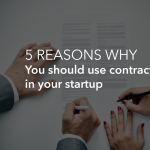Although not a prime driver in Maslow’s hierarchy or in other motivational theories, we all like making money. If not for the buzz of being able to launch dollar bills at girls in bikinis like a wannabe rap star, then at least for preventing an explosive stress disorder when you can no longer pay any of your bills.
As a founder of any company, determining what to pay yourself is like buying your first pair of skinny jeans, you never really know if what you’re doing is a good idea. It seems so at the time, but when the natural high slowly wears off and you’re face to face with an empty bank account and investors who want your head on a stick, it’s most probably going to end in tears (yes, that’s an awful analogy).
First things first, let’s take a look at some of the variables that could influence the salary needs of a founder:
Personal situation of the founder: are you married (to one or more people) with kids, a mortgage, and excruciatingly high bills every month? Does your wife or husband demand a new pair of Louboutin’s every month? As you can rightly imagine, the financial needs of this person would differ somewhat from a 19-year-old founder living in their parent’s garage whose dietary preferences resemble that of a penguin.
- Funds raised: has your startup raised a seed round or series A,B+? If you’re bootstrapping then go straight to the conclusion. If you’ve just raised $500K, and have $0 in revenue, then it’s pretty tricky to justify a wage of $100K/year. Under different circumstances, i.e. $50MM in the bank and hockey stick revenue growth, it’s easier to justify the Ferrari rental, private yacht for company meetings, etc.
- Equity: what is the equity structure like? Are your shares more diluted than your parent’s liquor cabinet when you were in high school? A founder who owns 10% of their company compared to another who owns 40% (assuming the valuations are the same) will most likely have different salary needs.
- History: how long have you been fighting the fight? A few moths, a few years? Someone who’s been raging war on startup land and living on peanuts for a few years isn’t at the same point than someone who’s just launched their company.
- Board: what does the board say? If you have a board, then as you know, they can have a big influence over what you take home each month, how you should dress, etc.
Do what the market says
Sites such as Glassdoor and Salary.com can be a fantastic source of information where you can compare salaries for someone at your stage, position, location, hairstyle etc. The ranges are pretty broad but it will give you an idea of what is the going market rate.
“Based on what I see in the market, I’d say the range for founder CEO salaries after a seed round is between $60k and $150k, with the average/median in the range of $90k – $110k,” VC Chris Sheehan has said on OnStartups.
If you can pay yourself a market-based wage then congratulations. Whether you’re at the point where you’ve raised so much money that $100k/year is inconsequential in the grand scheme of things or whether you can afford to because you’re profitable, it can act as a powerful driver for creating a solid business. Saying that you’re breaking even when your paying yourself in pens each month isn’t quite the same.
According to an interesting article on Entrepreneur, “as many as 90 percent of entrepreneurs underpay themselves in what often proves to be a misguided attempt at thrift. It then skews their understanding of how well their companies are performing, and in some cases dilutes the incentive they need to make their companies more profitable”.
Although quite a tough approach, it helps founders to take a look at reality and focus on growing their business. Ultimately, if you never get to the point where you can pay yourself a market-based wage then you know that something is going wrong.
You get what’s left of the pie
So, paying yourself a market-based wage is out of the question. You quite simply don’t have enough money. You are known as the king of bootstrapping. This model only works if your company is generating revenues and assumes that the founders get whatever is left after everyone else has been paid and after every operating expense and debt has been factored in.
There is no correct method
There is no correct answer to how much a founder should pay themselves, however my advice from personal experience is especially at the seed stage you need to be frugal, capital conscious and focused on developing your product and growing your business. Watching the burn at this point is essential as even the smallest fluctuation in spending can affect the course of your business. Once the hard work has been put in, once business models are validated, growing and once you have raised a series A and above, paying yourself a market-based wage is a good option. This wont hold for the Snapchat’s of the world who can pay themselves in Ferrari’s without any revenue but these are rare cases.
And from an investors standpoint? According to Peter Thiel, a CEO who has a low pay is one of the greatest indicators of a startup’s success. According to him this is one of his definitive factors when deciding to invest in a company or not:
“The lower the CEO salary, the more likely it is to succeed. The CEO’s salary sets a cap for everyone else. If it is set at a high level, you end up burning a whole lot more money. It aligns his interest with the equity holders. But [beyond that], it goes to whether the mission of the company is to build something new or just collect pay checks.”
We want to hear from you! How do you decide what to pay yourself?
Photo credit
One hundred dollar bills via Shuterstock
Hand drawn business ideas via Shuterstock









Leave a Reply